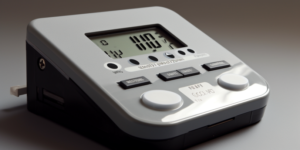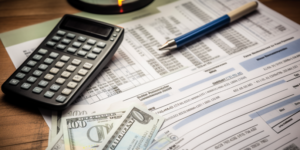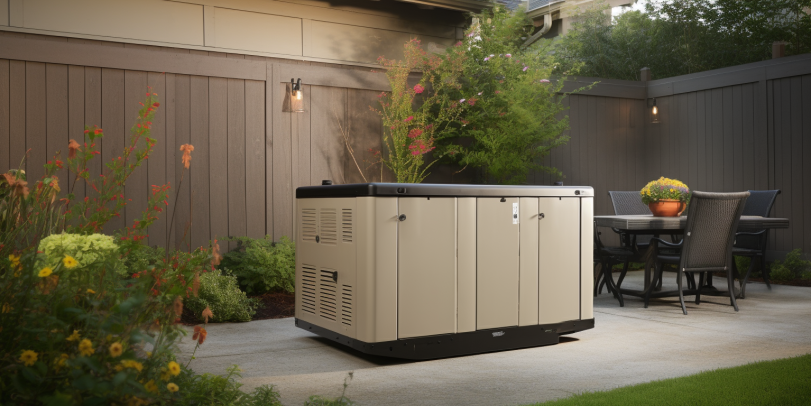
Choosing the right standby generator for your home is essential to ensure that you have a reliable power source during outages.
With a wide range of power capacities available, it is important to consider your specific needs and requirements.
Norwall PowerSystems offers standby generators with capacities ranging from 7000 watts to 150,000 watts, providing options for various power demands.
Portable generators in the 3500-watt range are suitable for powering basic appliances, while larger generators in the 5000-watt range can handle additional power needs such as coffee makers and microwave ovens.
If you require power for essential home systems, well pumps, electric hot water heaters, or larger central air conditioning units, standby generators in the range of 7000 to 20000 watts are recommended.
To ensure you choose the right generator for your specific needs, it is advisable to conduct a power audit and consult with an electrician.
By carefully considering your power requirements, you can select a standby generator that will provide reliable power during emergencies.
Key Takeaways
- Standby generators range in power capacities from 7000 watts to 150,000 watts.
- Portable generators in the 3500-watt range can power basic appliances, while 5000-watt generators can handle additional power needs.
- Standby generators with 120/240-volt outlets can power larger appliances like furnaces or small central air conditioners.
- Transfer switches with managed power options can extend the capability of standby generators to multiple appliances.
Choosing the Right Standby Generator
When choosing the right standby generator for a home, it is important to consider factors such as power capacity, the specific appliances and systems that need to be powered, and the need for power management options to ensure efficient and effective use of the generator.
The power capacity of the generator is crucial as it determines the amount of electricity it can provide during an outage. Different generator models offer varying power capacities, ranging from 7000 watts to 150,000 watts.
Additionally, it is essential to consider the specific appliances and systems that need to be powered during an outage to ensure that the generator can handle the load.
Furthermore, installation considerations should be taken into account, as standby generators are permanently installed appliances. Professional installation may be required to ensure proper functionality and safety.
By carefully considering these factors, homeowners can choose a standby generator that meets their power needs and installation requirements.
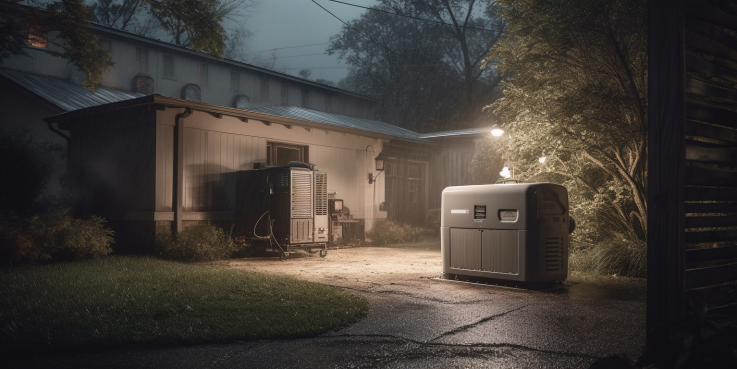
Factors to Consider
Factors to consider when selecting a standby generator for residential use include the range of power capacities available, with options ranging from 7000 watts to 150,000 watts, offering a broad spectrum of power solutions for various home sizes and electrical needs.
When choosing a standby generator, it is important to consider the installation requirements. Standby generators are permanently installed appliances that require professional installation to ensure proper functionality and safety.
Additionally, generator maintenance is another important factor to consider. Regular maintenance, such as oil changes and filter replacements, is necessary to keep the generator running smoothly and efficiently. Neglecting generator maintenance can lead to decreased performance and potential breakdowns.
Proper installation and regular maintenance are crucial for ensuring the reliability and longevity of a standby generator.
- Professional installation ensures safety and optimal performance.
- Regular maintenance is necessary for efficiency and reliability.
- Neglecting maintenance can lead to decreased performance and potential breakdowns.
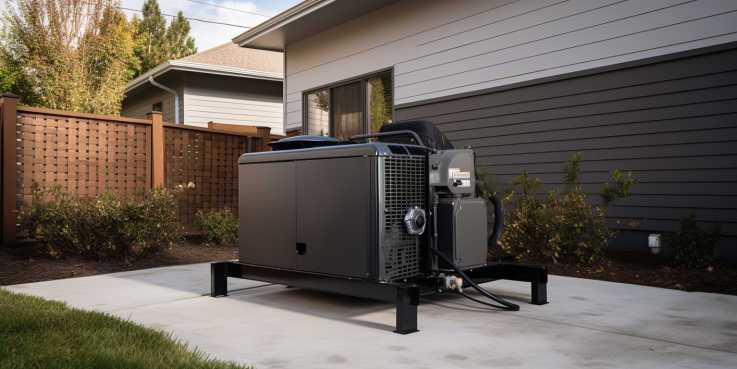
Power Capacity Options
One important aspect to consider is the wide range of power capacities available for standby generators, which can provide various power solutions for different home sizes and electrical needs. Generator sizing is crucial to ensure that the generator can meet the power requirements of the household during an outage. Power management strategies are also necessary to ensure that the generator operates efficiently and does not overload the system.
Here is a table showcasing the power capacity options for standby generators:
| Power Capacity | Suitable for | Examples of Appliances |
|---|---|---|
| 7000-9000 watts | Essential home systems and some additional loads | Lights, refrigerator, small appliances |
| 10000-13000 watts | Larger loads like well pumps, electric hot water heaters, and larger central air conditioning units | Well pump, electric hot water heater, larger central air conditioning unit |
| 14000-15000 watts | Multiple kitchen appliances (careful not to overload the system) | Refrigerator, microwave, dishwasher |
| 16000-20000 watts | Essential and several conveniences with managed power | Refrigerator, lights, TV, computer |
| 18kW-20kW | Larger homes with additional power needs | Multiple appliances, larger central air conditioning unit |
| 22kW-26kW | Most power from air-cooled standby generators | Whole house power, multiple appliances |
By considering the power capacity options and employing power management strategies, homeowners can choose the right standby generator that best meets their electrical needs during an outage.
